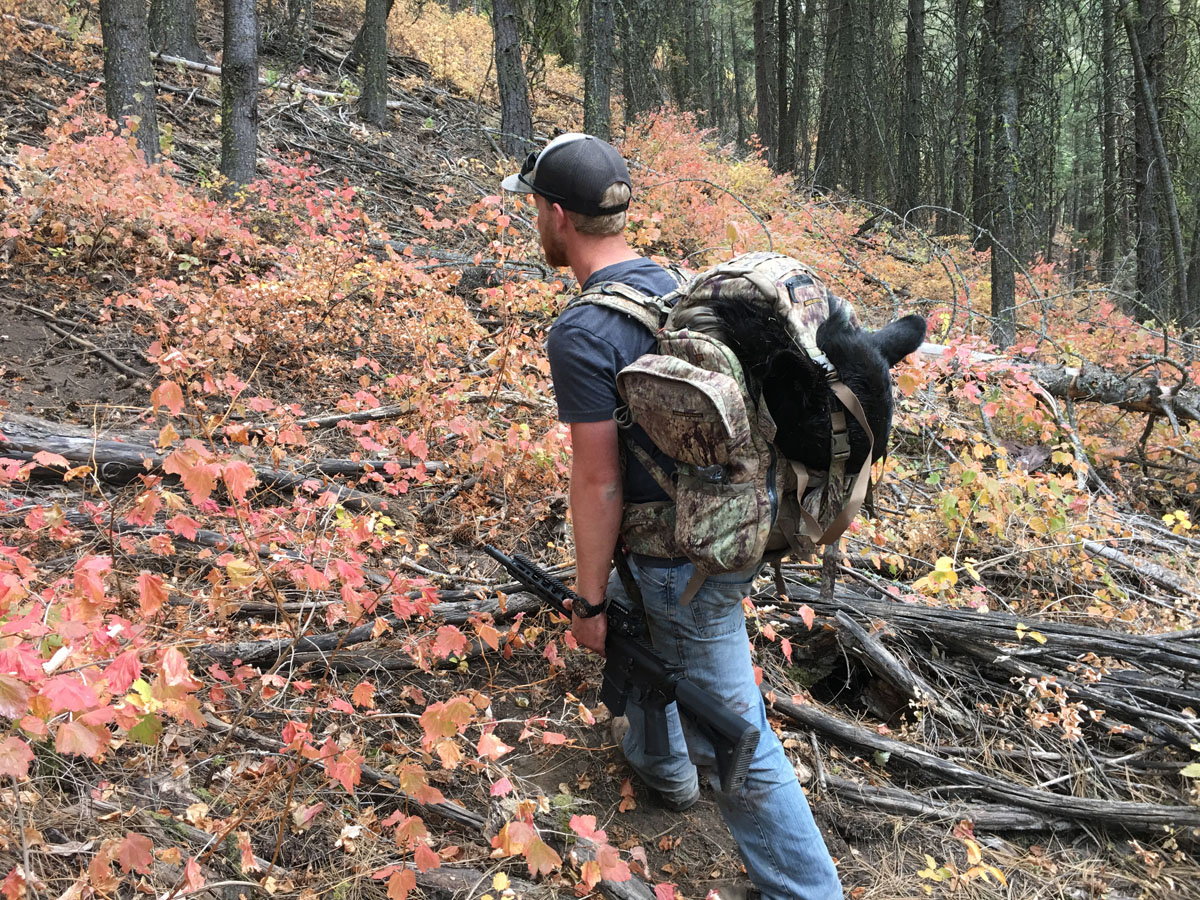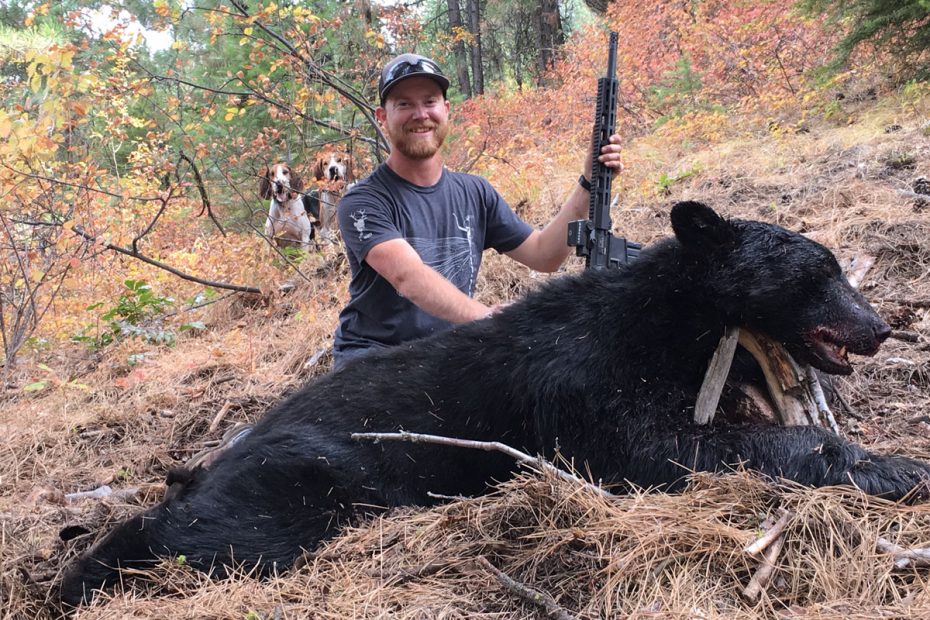I had the opportunity to take out a new rifle from Ruger—the AR-556 MPR chambered in 450 Bushmaster on a bear hunt this fall. Before I get to the hunt, I want to explain how the black bear is hunted. When hunting bear in Idaho, there are basically three different ways to go about doing it. The three methods include spot and stalk, baiting, and my own personal favorite, hound hunting. One of the reasons that hound hunting claims number one in my book is because of the complexity of the sport. It seems simple: buy a dog, let it go, and find the dog with the bear. This is not the case.
I grew up feeding and watering about a dozen Walker Hounds each day since I was five years old in order to complete my chores and play my role in sustaining my dad’s hobby. Because I am heavily involved with the behind-the-scenes work, I am aware of many parts of the sport that the majority of laypeople do not see.
The Complete Picture:
Hound hunters typically get into the sport because they had a friend with hounds who took them hunting once and they ended up enjoying the thrill that it provided. They then bought a few dogs and committed themselves to a journey.
It takes about $300 per month to feed 12 bottomless pits, several thousand dollars in tracking equipment, and an additional couple thousand in miscellaneous hunting equipment, not to mention wear and tear on the pickup you drive in order to just get started. That said, many people end up continuing on with their hound hunting endeavor because of another aspect of the hunt: the dogs themselves. They are the pride and joy of any houndsman. Houndsmen spend hours, days and weeks of their time in order to fine-tune these hunting machines. And they are just that: machines. Hounds live for the hunt. You cannot force a hound to chase after a ferocious ball of muscle, teeth, and claws. Instead, they have an innate drive to chase.
Houndsmen learn to shape and refine these creatures to be specific to certain game and efficient at the hunt. Because of their pure tenacity, it is almost frightening letting the dogs go knowing that you may spend the remainder of your day with miles and miles of walking in order to just recover them wherever they may end up. Thus, the thrill.

The Equipment
If you are not the one that is tending the hounds, the list of required gear is not extensive. For some of these items, I don’t have any specific recommendations due to personal preferences. But there are a few I highly recommend, so I will specify those. The things that I brought with me were as follows:
– Gun (Ruger AR-556 in 450 Bushmaster)
– Ammo (Hornady 450 Bushmaster 250 gr FTX)
– Knife (Gerber Vital razor knife)
– Pack (Eberlestock X2)
– Extra layers according to the weather
– Headlight
– Camera
– Food and water
– Proper licensing and permits
The most important item on the list, arguably, is the gun. I have been involved in shooting probably 100 bear or more in my life so I have seen what works well and what does not. You would expect that bigger is better, but I would argue against that logic. Many magnums (IE: 7mm Rem. Mag, 300 WSM, 28 Nosler, etc.) are what people show up with because of this thought. These rounds tend to penetrate through and through and then dump the rest of their remaining energy (typically a lot) into the tree or hill behind the bear. There’s a good time and place for them, but it is not hound hunting. On the other side of the coin, I have seen a bear shot with 44 Mag, 45-70 Gov. and 32 Special, to name a few. All of these do a much better job at killing these predators. Why? Because the round is so much bigger in diameter, the shock of the bullet going into the animal is much more traumatic. Also, because they are going slower, they will actually be caught within the animal, capturing 100% of the energy that the bullet left the barrel with, transferring into killing power. With this logic, I knew that the 5 rounds of Hornady 450 Bushmaster with a 250 gr bullet from the Ruger would be devastating on a black bear. If you disagree, that is okay, but personal experience has really proven this to me.

The Hunt
Most bear hunts start off in the pre-daylight hours of a weekend, but because I decided so late in the season to kill a bear, we chose to take advantage of the cool weekday afternoons in order to get some extra time and create more opportunities to find the bear I wanted. The day started out just as any: I went to work and dragged through it while thinking about guns and hunting. Once I got home, it was game time. All of the dogs were running around in the yard buzzing with excitement. For whatever reason, they always know when they are going to be taken out to hunt. I threw all of my gear into the bear hunting pickup (we have one dedicated to the sport) and my dad walked around the corner of the house quickly followed by a dozen running hounds who lined up and jumped into the dog box in the truck bed. Then it was all country music and summer air flowing through the pickup as we headed for the hills.

The first thing that we do when we arrive is to find a creek and let the dogs out to stretch and drink before the chase starts. Then they all get loaded onto the rigging rack on top of the pickup so they can smell for bear that have crossed, or have come near the road recently. Once they smell one, all of the dogs throw themselves into a frenzy of wagging tails, long bawling and twitching noses to make sure that you cannot miss it. The first afternoon of hunting, we struck four or five bears scents like this and ended up starting and catching three different ones. Sadly, they were all too small and were saved for another year.

The next available evening started out the exact same way, leading up to the first bear strike of the day. Once they abruptly exploded into barking, we unclipped the oldest, most experienced dogs, just as we always do. These hounds jumped off of the back of the pickup and slammed their noses to the ground, barking and chasing the scent. Once they started covering ground, we released all of the hounds and stood wondering if we would ever get them back, while we stared at the GPS screen hoping to guess how they would travel and where they would end up. Within the hour, the GPS alerted us that the dogs were all stopped. After a short drive, the work began. I grabbed my gear and headed off toward the tree with some leashes. Sadly, this first bear of the day was also a small one, so we collared the panting dogs and headed back up the hill.

We caught two more bears that afternoon that were also too small, so in hopes of finding a bigger bruin, we headed to a dead end road on a less accessible side of the mountain with the dogs following close behind. Free casting them like this is usually productive when in a creek bottom or dark canyon. Sure enough, their tails started helicoptering and noses went to work as they started trailing out. Next thing we knew, all of the hounds were gone and we could hear their barks echoing down the canyon. Again, within the hour, the dogs had caught the bear. Naturally, there were no roads near the bear due to the nature of the area where we had released them. After busting brush down into the canyon, we finally arrived at a tree with a large, mature boar lounging midway up a prize-sized yellow pine.

After leashing up the hounds to the surrounding trees, I found the spot that offered the clearest view and best angle for a shot on the bear. Because the bear is in a tree, the shot is never long, but can be tricky because of branches in the way. Luckily, this was not a problem. “Ready?” I asked my dad. “Yep, shoot him,” was his reply. All it took was one shot and the bear folded. He was dead before he hit the first branch on the way down.
Naturally, the dogs all fell silent when the shot went off and then erupted into maximum loudness as they saw the bear fall. As a reward, the dogs got let off of the leash once the bear was confirmed dead and they got to give him the final remarks before we chained them back up and went to work skinning the bear. In the autopsy, I saw that I hit the bear exactly where I was aiming. Typically, we like to shoot bear straight on in the center of the chest or behind the front shoulders. This is because bear vitals sit further back than most, and these shots do the most damage for the quickest kill. Because I was confident in the caliber as well as curious, I squared him up right on the front shoulder. The bullet went in as a .45 caliber hole and quickly turned into a much bigger cavity by the time it entered the chest, providing for major hemorrhaging.

Needless to say, the Hornady 450 Bushmaster 250 gr round coming out of the Ruger AR-556 MPR impressed me and I will definitely trust my life to it while hunting dangerous game like this again.
The rest of the day simply consisted of packing the bear out of the steep hole that we caught him in and then going on to catch one more. In total, we caught four bears in a single evening. In the course of the two days during which I really hunted for a bear to kill, we ended up catching seven to choose from. If this doesn’t prove that hound hunting is the most efficient way to hunt bear, I don’t know what does. Assistance from the best dogs in Idaho certainly helps, too.

Visit [track-link url=”https://www.hornady.com/ammunition/black#!/” campaign=”Hornady450″ target=”_blank”]Hornady[/track-link] for the Ammunition I used.
Visit [track-link url=”https://www.ruger.com/products/ar556MPR/specSheets/8522.html” campaign=”Ruger450AR” target=”_blank”]Ruger[/track-link] to check out the AR-556 MPR in 450 Bushmaster. Watch for a complete review of the Ruger 450 Bushmaster rifle in an upcoming GunsAmerica Digest
